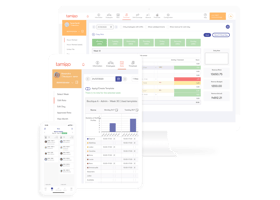From reducing costs to speeding up hiring, there’s lots of reasons to adopt digital signatures. And if you’re a tamigo customer, you don’t need another service to start using them!
Digital signatures are easily added to your HR workflows through our Addo Sign integration.
In this article, we’ll cover digital signature basics first, before moving onto benefits.
Ready to get started with digital signatures now? Visit this page to learn more.
What is a digital signature?
Digital signatures are the electronic equivalent of written signatures. They let you indicate legally binding agreement to an online document, without needing to print and sign by hand.
To ensure security, digital signatures employ technology known as Public Key Infrastructure (PKI). This maintains the integrity of the document being sent, while also verifying the identity of the person signing it.
How do digital signatures work in tamigo?
tamigo's Addo Sign integration acts as a powerful extension to our contract generation module.
It gives you a complete, optimised HR document workflow. Generate docs, send them, collect signatures from both employees and managers, and then store them — all digitally and all within tamigo.
A log of the entire flow is created automatically. Plus, you can automate the process of sending reminders.
Employee contracts are the primary use case. That makes it ideal for large retailers, who have a steady turnover of hourly workers.
Digital signatures also work just as well for GDPR notices, contract amendments, health and safety policies, etc.

5 benefits of using digital signatures
Reasons your HR team, your employees and your entire business will love digital signatures.
1. Increase organisational efficiency
You know the power of digital transformation. As McKinsey states in its 2022 tech transformation in retail report:
"Technology will be a core driver of next-generation retail growth and will fuel omnichannel customer experience, smart offerings, and lean operations."
Digital signatures fit right into those lean operations, drastically reducing turnaround time on documents.
This is especially valuable during recruitment. New hires and managers can sign in minutes, not the hours or days it takes when contracts are sent via email or post.
Plus, it’s far more transparent. Instead of being filed away on an office shelf, signed docs are available online in tamigo — readily accessible to the relevant stakeholders. That includes the employees themselves, eliminating communication bottlenecks.
2. Free up your HR team
According to a Society for Human Resources Management study, 42% of HR professionals say that limited time is their greatest barrier to achieving organisational goals.
That's no surprise in 2023. We're still dealing with record skilled labour shortages, so your HR team are doubling down on recruitment, while also spearheading new employee retention efforts.
That equals mountains of paperwork. Hundreds, if not thousands, of documents to be sent out every month. And all the printing, scanning, emailing, posting and following-up that entails.
Digital signatures eliminate the need for these repetitive tasks, freeing up your HR team to spend time on more valuable work.
3. Ensure compliance and security
Digital signatures are as legally binding as their written counterparts. It’s been that way for a while. The EU first passed an e-signature directive in 1999, while the US followed suit a year later.
When it comes to security, there’s no question that digital signatures actually come out on top.
- Impossible to forge. Signees must verify their identity to digitally sign. In tamigo, you can choose what verification method they use. Options include their national eID (such as Denmark’s NemID) or an SMS code.
- Audit trail included. The digital signing process generates a log of every action, which is stored in Addo Sign's secure online server. It’s a complete record of when the document was sent, opened, signed and so forth.
- Tamper proof. Once your document is signed, it’s automatically ‘digitally sealed’. This stops it from being altered in any way from that point on.
4. Improve the employee experience
Convenience is a big selling point of digital signatures.
Your staff can sign in a matter of minutes and then get on with their day — from anywhere, on any device. If they're on the job, productivity doesn’t take a hit.
The same is true for anyone you’re recruiting too.
Requiring new hires to print, sign, scan and then email back their contract is a clunky process. Especially if they don’t own a printer or scanner. Or, alternatively, asking them to wait days for the contract to land in their postbox.
Digital signatures create a great impression of a modern company that prioritises the employee experience.
5. Decrease your environmental impact
Sustainability is a core principle for many of our customers. Reducing your use of paper can have an immediate impact.
That's because, while paper is made from a renewable resource, it’s far from an eco-friendly material.
First up, there’s the wood it’s made from. Unsustainable harvesting of trees is contributing to deforestation and habitat destruction in countries like Brazil and Borneo.
Then there’s the production process. The paper and pulp industry is the world’s fourth largest consumer of energy, much of which is generated by burning fossil fuels. Paper production requires lots of water too — as much as 20 litres to make a single A4 sheet!
Want to get started with digital signatures?
To learn more about beginning to use digital signatures in tamigo, you can visit our digital signatures page. Just hit the button below.





